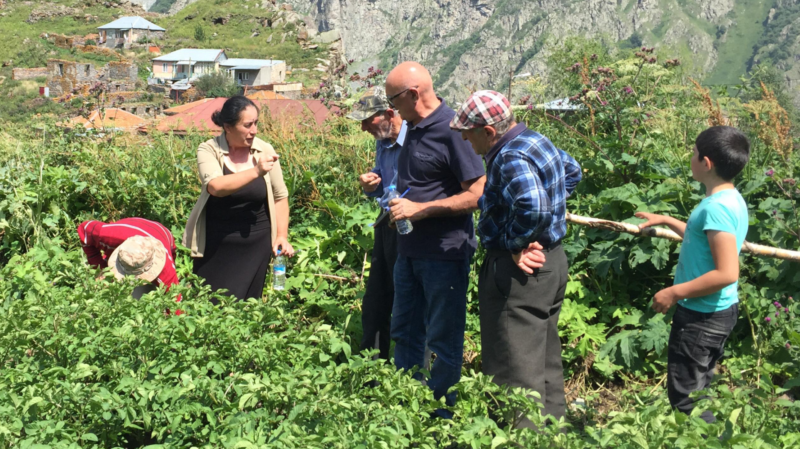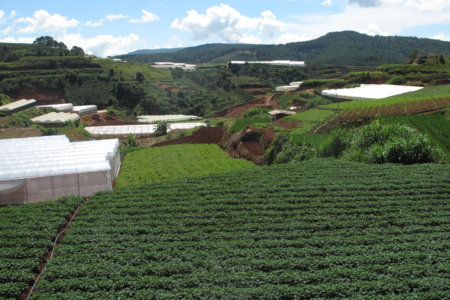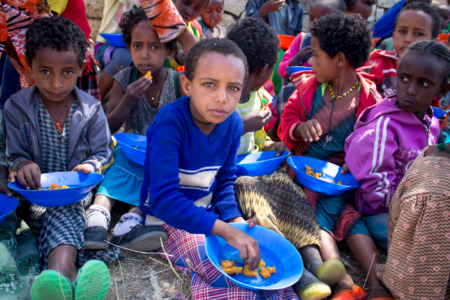
Enhancing rural livelihoods: Introducing integrated seed health approaches to local potato seed systems.
This project aims to improve the livelihoods of Georgian farmers and rural communities by increasing the profitability and sustainability of potato crops and building the capacity of national stakeholders in the seed potato value chain.
Background
Potato forms a major part of Georgian diets, culture, and heritage—“second bread,” they call it. Georgians eat around 55 kg of potatoes per person per year, mostly as fresh produce. This figure is well above the world average of around 33 kg. However, yields remain generally low at approximately 12 tons per hectare (ha), a figure well below the potential 30 tons/ha. Potato seed degeneration is the main constraint, caused by the accumulation of pests and diseases in seed potatoes over several cycles of propagation.
In many locations, the introduction of certified seed systems is one option to address this challenge, but it has not proven successful in low-income countries such as Georgia. A more viable option promoted by the International Potato Center (CIP) is the ‘integrated seed health’ strategy. This approach combines better plant resistance with improved on-farm management practices, including seed potato selection and storage combined with strategic use of high-quality certified seed.
This project builds on ongoing collaboration between CIP and Georgia’s Ministry of Environmental Protection and Agriculture (MoEPA) and it will guide government efforts to strengthen the potato seed systems and value chain in the country. CIP’s partners in the project include the Scientific Research Center of Agriculture, Georgia’s information-consulting centers, the Agricultural University of Georgia, and the University of Natural Resources and Life Sciences in Austria
Objectives
The overall goal is to improve the livelihoods of Georgian farmers by increasing the profitability and sustainability of their potato-growing enterprises. The project also aims to increase the capacity of national stakeholders in the potato value chain to multiply and disseminate quality seed potatoes thereby improving the quality of potato seed available to farmers in the country.
Approach
In early 2016, the International Potato Center (CIP) began working with the Georgia’s MoEPA in a major restructuring program designed to create a more effective, efficient, and sustainable potato seed system. The work focused on providing improved potato germplasm and technical support to enhance potato research and dissemination through breeding, plant protection, seed systems, and post-harvest technologies. This project complements these collaborative activities by addressing integrated seed health more specifically.
The first step involved the development of a potato seed plan to incorporate integrated seed health strategies developed specifically for Georgia, and a baseline study and mapping exercise. These reports identified weaknesses in the current seed system and offered solutions, including appropriate disease detection technologies, multiplication practices, certification protocols, and primary training needs. Based on these recommendations, CIP developed a training plan for on-farm seed management, focusing on introducing best practices for the management of self-saved seed and developing farmer training plans and ‘training of trainer’ courses. The final stage in the implementation of the project will be the identification and promotion of new virus-resistant varieties.

Expected outcomes
Addressing potato seed degeneration will increase productivity with minimal input from farmers. The benefits accrue from the availability of new resistant varieties, application of simple on-farm practices, and enhanced access to high-quality seed at affordable prices.
CIP works with the Scientific Research Center of Agriculture of Georgia to support the improvement of seed multiplication and certification, with a focus on validating disease-detection technologies that are appropriate for the country. Activities build on the existing farmer extension service network to disseminate technologies and newlyintroduced varieties. Seed system analysis and modeling are carried out by the two participating universities. In this way, the project directly supports capacity development among several institutions and provides the government with science-based evidence to inform seed policy.
Achievements to date
By November 2019, CIP had established evaluation trial plots and undertaken a field trial to test virus resistance in 28 new potato genotypes and four existing potato varieties. Consequently, four CIP clones were pre-selected and recommended to Georgia’s authorities for release in the country.
As part of CIP’s promotional activities, it has developed a series of training guides on integrated seed health for farmers and extension workers which have been distributed through 54 regional information-consulting centers of MoEPA. Capacity building workshops have also been delivered to nearly 600 farmers, extension trainers and scientists in Georgia on seed management, viral symptoms identification, integrated seed health, and potato seed degeneration modelling.
These activities have been supported by a series of public awareness activities on national and regional media outlets. An animation video on potato seed improvement was developed and aired on 30 regional and national TV channels for three months. Preliminary analysis of audience reach based on seven of the 30 broadcasters indicates that materials were watched by 71,000 households.
| Key outcomes | By November 2019 |
| Extension guidelines on integrated seed health improvement | four disseminated to 54 regional informationconsulting centers |
| Capacity building training and workshops | 551 farmers, extension trainers and scientists |
| Reach of animation video on potato seed improvement | >71,000 households |
| CIP clones recommended for release | 4 |
Contact
Rusudan Mdivani
CIP, Georgia
r.mdivani@cgiar.org
Thanks to our donors



